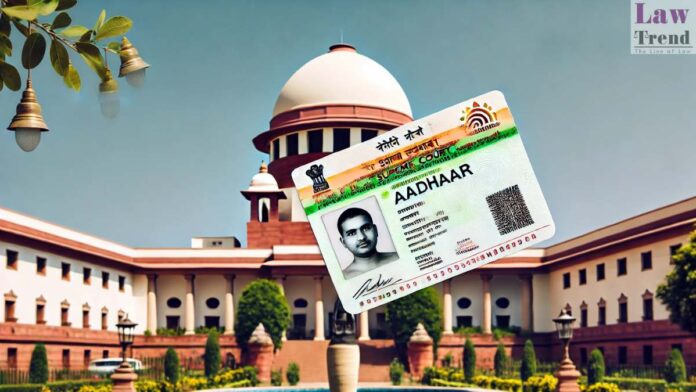The legal validity of documents establishing an individual’s date of birth is critical across a range of legal and government-related processes. Accurate date-of-birth verification influences decisions in both criminal and civil contexts, such as determining whether an individual will be tried as a juvenile or an adult, and is essential for registering in various governmental schemes, which often base eligibility on age. In these proceedings, the reliability of identification documents is primarily assessed based on their authenticity, accuracy, and adherence to standardized verification protocols, ensuring that they serve as trustworthy records of an individual’s age.
To maintain the standard Registration of Births and Deaths Act of 1969 grants authority to the Registrar General to oversee and standardise birth and death records, who further under the said Act holds the authority to direct the Chief Registrar in unifying and coordinating the state’s birth and death records. The Act also enables the state government to appoint a Chief Registrar, with responsibilities further delegated to local authorities in districts, municipalities, panchayats, and other jurisdictions. Additionally, the Act empowers the state government to authorize individuals to record births and deaths and to certify causes of death. Birth certificates are issued upon timely registration with a local authority within 21 days of the event. These certificates are verified against hospital records, ensuring that they serve as a highly credible proof of date of birth thus enhancing accuracy and reliability.
Other documents such as the PAN Card issued by the Income Tax Department, Driving License issued by a state’s transport department, Passport, and school records like the 10th-grade mark sheet or a school-leaving certificate from a recognized board are also legally accepted as proof of date of birth. The verification process of such documents before issuance undergo strict verification processes, which often include cross-checks against birth certificates, thus adding additional layers of authenticity.
In the last decade or so, the commoner has relied heavily on the Aadhaar card not only for identification but also as proof of age. With very high penetration and integration into government welfare schemes, Aadhaar has emerged as a centrepiece in India’s identification infrastructure since its inception in 2009, revolutionizing the way the residents of India identify themselves. This 12-digit unique identification number is issued by the Unique Identification Authority of India (UIDAI) and is based on biometric data under which any resident can voluntarily enroll irrespective of age and gender. However, despite usage, Aadhaar does not provide rigid verification of date of birth, and it is issued as a proof of identity and address, but not as irrefutable proof of date of birth, which the Supreme Court of India also discussed in the case of Saroj & Ors. vs. IFFCO-Tokio General Insurance Co. & Ors.
The Supreme Court of India was hearing an appeal made by a man whose claim for compensation under the Motor Vehicles Act,1988 has been confirmed by the Punjab and Haryana High Court earlier. The Punjab and Haryana High Court has accepted that an Aadhaar card will be sufficient to determine the age of a road accident victim to calculate compensation. A bench comprising of Justices Sanjay Karol and Ujjal Bhuyan held that a school-leaving certificate as provided in Section 94 of the Juvenile Justice Act, 2015 has to be taken into account to determine age. The court noted that UIDAI, through a 2023 circular referencing a Ministry of Electronics and Information Technology memorandum, clarified that while Aadhaar could establish identity, it is not intrinsically valid as proof of date of birth.
The Supreme Court’s ruling disqualifying Aadhaar as valid proof for verifying date of birth is expected to have a far-reaching impact across several sectors that have depended on it, thereby increasing documentation requirements in areas such as education, banking, government schemes, employment, and healthcare. In the education sector, for instance, students will now be required to present alternative documents, like birth certificates, for admissions and scholarships, which may complicate access. Banks are likely to demand additional documents, such as PAN cards, for opening accounts and completing KYC processes, creating new challenges, particularly for those in rural areas. Government welfare schemes, like pensions and the Public Distribution System (PDS), will need alternative date-of-birth verification, potentially resulting in re-verification procedures and delays in benefit distribution. Employment eligibility for government jobs and training programs will similarly require valid proof of date of birth, adding steps to the application process. In healthcare and insurance, programs like Ayushman Bharat and age-based insurance policies will necessitate alternative documents, possibly delaying access and increasing administrative workloads.
For citizens, especially those in remote areas, this ruling translates to additional efforts to acquire recognized documents, highlighting the need for simplified access to universally accepted IDs to enable smoother participation in essential legal and governmental-related services. This decision underscores the necessity of thorough document verification processes while calling attention to the limitations of Aadhaar in serving as definitive proof of date of birth.
Author:
Ishika Agarwal
(The author of this piece is a first-year student at Dr. Ram Manohar Lohiya National Law University, Lucknow. Views and opinions expressed are personal.)




